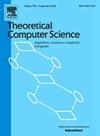具有有界语义的概率一阶时间逻辑的单片段
IF 1
4区 计算机科学
Q3 COMPUTER SCIENCE, THEORY & METHODS
引用次数: 0
摘要
我们用时间算子扩展(类型-2)概率一阶逻辑,在(离散)时间的定长初始段上解释。给定结果逻辑的公式φ和自然数N,我们问:φ在长度为N+1个状态序列(一阶结构)的空间上是否可满足?我们证明了一阶部分具有可判定可满足性问题的单阶逻辑片段的可判定性问题,并建立了一阶部分在一些已知的一阶逻辑可判定片段中的计算复杂度。本文章由计算机程序翻译,如有差异,请以英文原文为准。
Monodic fragments of probabilistic first-order temporal logic with bounded semantics
We extend (type-2) probabilistic first-order logic with temporal operators, interpreted over fixed-length initial segments of (discrete) time. Given a formula φ of the resulting logic and a natural number N, we ask: is φ satisfiable over a space of length sequences of states (first-order structures)? We show the problem to be decidable for monodic fragments of the logic whose first-order part has a decidable satisfiability problem and we also establish the problem's computational complexity when the first-order part is among some well-known decidable fragments of first-order logic.
求助全文
通过发布文献求助,成功后即可免费获取论文全文。
去求助
来源期刊

Theoretical Computer Science
工程技术-计算机:理论方法
CiteScore
2.60
自引率
18.20%
发文量
471
审稿时长
12.6 months
期刊介绍:
Theoretical Computer Science is mathematical and abstract in spirit, but it derives its motivation from practical and everyday computation. Its aim is to understand the nature of computation and, as a consequence of this understanding, provide more efficient methodologies. All papers introducing or studying mathematical, logic and formal concepts and methods are welcome, provided that their motivation is clearly drawn from the field of computing.
 求助内容:
求助内容: 应助结果提醒方式:
应助结果提醒方式:


